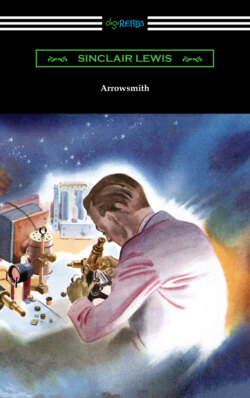Читать книгу Arrowsmith - Sinclair Lewis - Страница 13
На сайте Литреса книга снята с продажи.
ОглавлениеVI
Digamma Pi was housed in a residence built in the expansive days of 1885. The living-room suggested a recent cyclone. Knife-gashed tables, broken Morris chairs, and torn rugs were flung about the room, and covered with backless books, hockey shoes, caps, and cigarette stubs. Above, there were four men to a bedroom, and the beds were iron double-deckers, like a steerage.
For ash-trays the Digams used sawed skulls, and on the bedroom walls were anatomical charts, to be studied while dressing. In Martin’s room was a complete skeleton. He and his roommates had trustingly bought it from a salesman who came out from a Zenith surgical supply house. He was such a genial and sympathetic salesman; he gave them cigars and told G. U. stories and explained what prosperous doctors they were all going to be. They bought the skeleton gratefully, on the installment plan. . . . Later the salesman was less genial.
Martin roomed with Clif Clawson, Fatty Pfaff, and an earnest second-year medic named Irving Watters.
Any psychologist desiring a perfectly normal man for use in demonstrations could not have done better than to have engaged Irving Watters. He was always and carefully dull; smilingly, easily, dependably dull. If there was any cliché which he did not use, it was because he had not yet heard it. He believed in morality—except on Saturday evenings; he believed in the Episcopal Church—but not the High Church; he believed in the Constitution, Darwinism, systematic exercise in the gymnasium, and the genius of the president of the university.
Among them, Martin most liked Clif Clawson. Clif was the clown of the fraternity house, he was given to raucous laughter, he clogged and sang meaningless songs, he even practiced on the cornet, yet he was somehow a good fellow and solid, and Martin, in his detestation of Ira Hinkley, his fear of Angus Duer, his pity for Fatty Pfaff, his distaste for the amiable dullness of Irving Watters, turned to the roaring Clif as to something living and experimenting. At least Clif had reality; the reality of a plowed field, of a steaming manure-pile. It was Clif who would box with him; Clif who—though he loved to sit for hours smoking, grunting, magnificently loafing—could be persuaded to go for a five-mile walk.
And it was Clif who risked death by throwing baked beans at the Reverend Ira Hinkley at supper, when Ira was bulkily and sweetly corrective.
In the dissecting-room Ira was maddening enough with his merriment at such of Martin’s ideas as had not been accepted in Pottsburg Christian College, but in the fraternity-house he was a moral pest. He never ceased trying to stop their profanity. After three years on a backwoods football team he still believed with unflinching optimism that he could sterilize young men by administering reproofs, with the nickering of a lady Sunday School teacher and the delicacy of a charging elephant.
Ira also had statistics about Clean Living.
He was full of statistics. Where he got them did not matter to him; figures in the daily papers, in the census report, or in the Miscellany Column of the Sanctification Herald were equally valid. He announced at supper table, “Clif, it’s a wonder to me how as bright a fella as you can go on sucking that dirty old pipe. D’you realize that 67.9 per cent of all women who go to the operating table have husbands who smoke tobacco?”
“What the devil would they smoke?” demanded Clif.
“Where’d you get those figures?” from Martin.
“They came out at a medical convention in Philadelphia in 1902,” Ira condescended. “Of course I don’t suppose it’ll make any difference to a bunch of wise galoots like you that some day you’ll marry a nice bright little woman and ruin her life with your vices. Sure, keep right on—fine brave virile bunch! A poor weakling preacher like me wouldn’t dare do anything so brave as smoke a pipe!”
He left them triumphantly, and Martin groaned, “Ira makes me want to get out of medicine and be an honest harness maker.”
“Aw, gee now, Mart,” Fatty Pfaff complained, “you oughtn’t to cuss Ira out. He’s awful sincere.”
“Sincere? Hell! So is a cockroach!”
Thus they jabbered, while Angus Duer watched them in a superior silence that made Martin nervous. In the study of the profession to which he had looked forward all his life he found irritation and vacuity as well as serene wisdom; he saw no one clear path to Truth but a thousand paths to a thousand truths far-off and doubtful.
